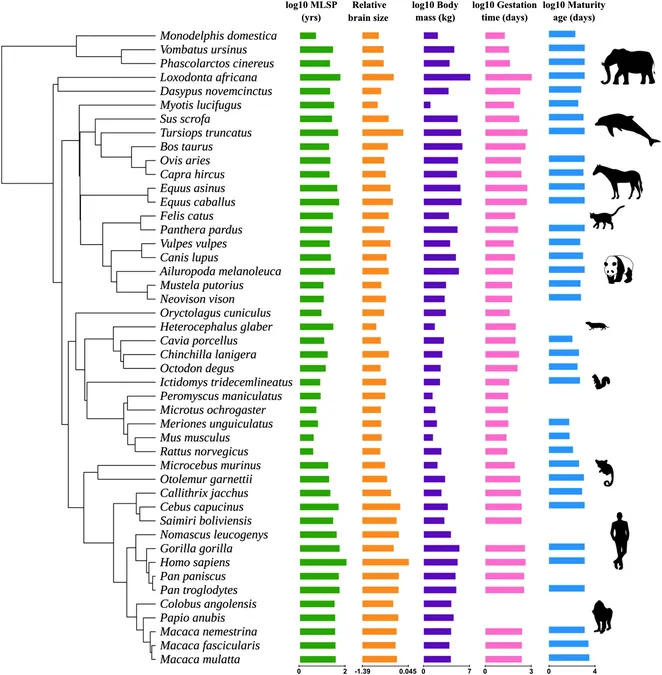
Unlocking the Mystery of Lifespan: Why Some Creatures Live for Centuries While Others Fade Away in Days
2025-08-23
Author: Daniel
The Lifespan Enigma
Ever wondered why bowhead whales can swim through life for over 200 years while tiny shrews barely see their first birthday? And let’s not forget the astonishing sea sponges, some of which have been around for over 15,000 years! These differences spark a compelling question: What biological secrets allow some animals to thrive for centuries?
Breaking Down Longevity: Beyond the 'Longevity Gene'
In search of answers, scientists have shifted their focus from hunting for that elusive 'longevity gene' to understanding the patterns among collections of related genes across various species. This approach reveals fascinating insights into the world of genetics.
Gene Families and Lifespan Connections
Researchers define gene families as groups of related genes that may become duplicated over time. The additional gene copies can enhance certain functions or provide leeway for minor adjustments, ultimately helping organisms adapt better to their environment.
Dr. Benjamin Padilla-Morales from the University of Bath led a groundbreaking study examining the genomes of 46 mammalian species. By associating maximum lifespan potential (MLSP)—the longest confirmed age of any individual in a species—with the sizes of thousands of gene families, they uncovered vital connections.
The Immune System: The Secret to Longevity?
The most striking pattern? A robust connection between longevity and immune system gene families. Long-lived mammals displayed larger families of genes that are pivotal for immune surveillance, helping to fight off threats and clear the cellular debris that accumulates with age. This means that maintaining a healthy immune system could be key to a longer life.
Brain Power: A Link to Longevity?
Interestingly, the study also highlighted a relationship between brain size and lifespan. Species with relatively larger brains tend to have longer lives, which ties back to the same gene families that expand with increased lifespan. The demands of a larger brain—such as higher energy consumption—require more sophisticated maintenance and immune functions to support stability in neural tissues.
Myth-Busting: What Doesn’t Matter for Lifespan
Surprisingly, factors like body size, gestation periods, and reproduction age didn't contribute to the observed expansions in gene families related to longevity. In fact, long-lived species don't simply have more genes; they possess specific families that are geared towards maintenance and defense.
Implications for Humans and Beyond
The implications of this research extend to humans! The human versions of these longevity-associated genes are often more active, producing various protein forms that allow for a more adaptable cellular response. This suggests that our cells might also benefit from heightened immune responses as we age.
A Cautious Perspective on Longevity Research
It’s crucial to note that these findings don’t promise a miraculous 'cure for aging.' They reveal correlations, not direct causes, and while certain gene families might expand for varied reasons, one thing stands clear: systems-level resilience plays a pivotal role in the longevity of mammals.
Looking Forward: Researching Lifespan Across Species
In summary, this fascinating study indicates that it’s not about one magical metabolic change that grants longevity; it’s about having an array of genes that help detect and address cellular damage, particularly in the brain. This research shifts the paradigm towards bolstering immune functions and cellular upkeep—crucial elements for healthy aging.
Published in the journal Scientific Reports, this study serves as a reminder that evolution favors systems capable of preventing small issues from escalating into major problems—an insight we can all learn from.



 Brasil (PT)
Brasil (PT)
 Canada (EN)
Canada (EN)
 Chile (ES)
Chile (ES)
 Česko (CS)
Česko (CS)
 대한민국 (KO)
대한민국 (KO)
 España (ES)
España (ES)
 France (FR)
France (FR)
 Hong Kong (EN)
Hong Kong (EN)
 Italia (IT)
Italia (IT)
 日本 (JA)
日本 (JA)
 Magyarország (HU)
Magyarország (HU)
 Norge (NO)
Norge (NO)
 Polska (PL)
Polska (PL)
 Schweiz (DE)
Schweiz (DE)
 Singapore (EN)
Singapore (EN)
 Sverige (SV)
Sverige (SV)
 Suomi (FI)
Suomi (FI)
 Türkiye (TR)
Türkiye (TR)
 الإمارات العربية المتحدة (AR)
الإمارات العربية المتحدة (AR)